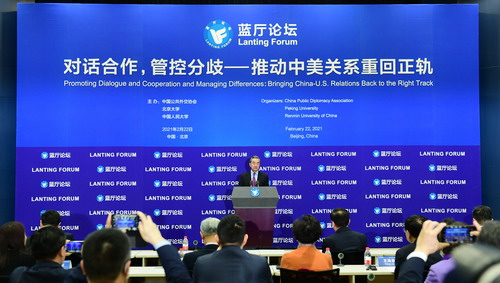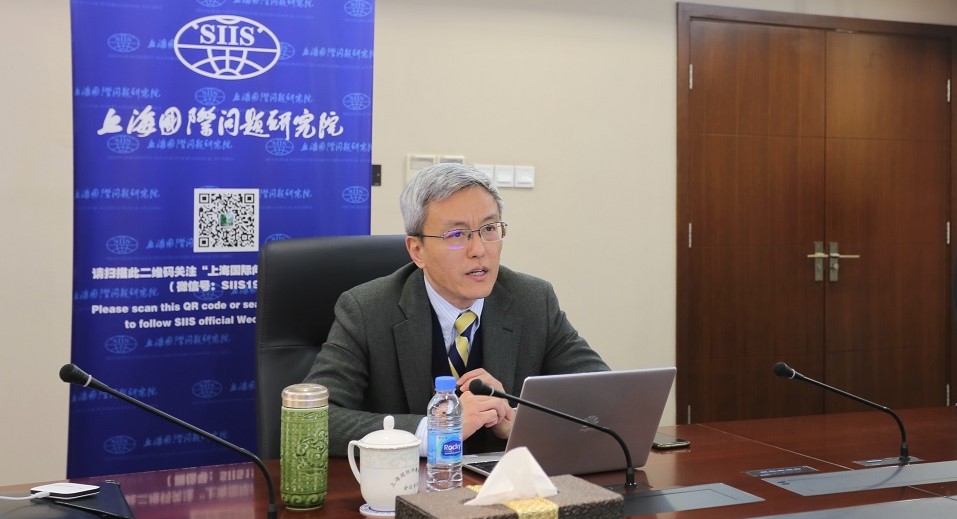On January
22, 2021, The Lanting Forum themed “Promoting Dialogue and Cooperation and
Managing Differences: Bringing China-U.S. Relations Back to the Right Track”
was successfully held in Beijing. H.E. Wang Yi, State Councilor and
Foreign Minister, delivered a keynote speech at the opening ceremony.

President
Chen Dongxiao of Shanghai Institutes for International Studies was invited to participate
in the forum virtually and deliver a speech at one of the sub-forums themed
“Reshaping Political Trust”.

The event
was co-organized by the China Public Diplomacy Association, Peking University
and Renmin University of China.
The full
text of Prof. Chen's speech is as follows.
Rebuilding China-U.S. Political
Trust for a New Global Agenda
Chen Dongxiao
This session’s theme, “Rebuilding Political Trust,” echoes that of the “Davos Agenda 2021” conference held late last month. It reflects our growing concern about a global trust deficit that is widening with each passing day.
For China and the United States, any discussions about political trust will be incomplete if they are only limited to bilateral structural issues. Whether Beijing and Washington can set a new agenda for global cooperation would go a long way toward deciding whether the two pivotal players with systematic impact can rebuild the necessary mutual trust to help the world weather the still rampaging coronavirus pandemic and its economic, social, political aftermaths. In this regard, I would like to share two of my observations.
First, efforts to rebuild trust should begin with identifying four major underlying causes of the global trust deficit. The first cause is the growing inequality and divisions along social class, racial, geographic, and industry lines in the aftermath of pandemic, exacerbating the existing animosity and recrimination along these fault lines. The second cause is the intensifying ideological rivalry between great powers that is dampening the desire for international cooperation. The third cause is widespread distrust of science and rationalism. On the one hand, a resurgence of anti-intellectualism that dismisses the role of science is impeding the global response to the pandemic. On the other hand, there is also a popular antipathy toward the capital/profit-oriented model of scientific and technological innovation. The fourth cause is mainstream media’s eroding credibility. As established media is preoccupied with debunking rumors and conspiracy theories, and new media busy creating clickbait, few cares much about disseminating facts and building consensus, further undermining public trust in media credibility.
My second observation is that to alleviate the global trust deficit, visionary politicians and policymakers in China and the Untied States should focus on the following four lines of effort to lay the groundwork for building greater mutual trust.
First,
promoting inclusive development. Global uneven and insufficient
development stands in the way of any trust-building effort. Beijing and
Washington should make more vigorous effort to advocate inclusive growth and
development by focusing on building an open economic order and improving
the global governance architecture. The most pressing task before us today
is to push back against vaccine nationalism and profit-maximizing practices and
uphold a “one world, one fight” spirit to overcome the global pandemic at the
earliest date possible.
Second, saving the fragile earth ecosystem. In this Anthropocene epoch, global recovery is impossible without salvaging our ecosystem first. Beijing and Washington share the historical responsibility to lead the worldwide effort to achieve carbon reduction and neutrality. In this regard, China and the United States should join hands in pushing for a special conference under auspices of the UN dedicated to reinvigorating the 2030 Agenda to realize a green economic recovery. The conference should focus on the requirements, pathways, and responsibility-sharing for such a recovery.
Third, strengthening multilateral and multi-stakeholder cooperation. UN Secretary-General António Guterres has called for innovative approaches to global governance and multilateralism that suit the needs of the 21st century. For the sake of salvaging global economic recession, for instance, China and the United States could push for a sweeping debt relief program under the G-20 framework involving multiple participants and multi-track efforts with a view to helping alleviate poor countries’ debt burdens by conducting equal dialogues among multi-stakeholders to share regulatory, governance, and relief responsibilities among creditors, debtors, and international financial institutions.
Fourth,
upholding the “technology for social good” principle. China and the United
States should promote the role of the ethical frameworks of science in
regulating and driving scientific and technological activities in the direction
of bringing greater prosperity, equity, and justice to human society. For
example, Beijing and Washington could support the UN’s effort to set up a
high-level expert panel on “technology for social good” dedicated to
studies of legal, ethical, and social issues around emerging technologies like
data governance, artificial intelligence, and biotechnology.
About 160 years ago the late American President Lincoln once famously said: “As our case is new, so we must think anew, and act anew.” Today, as we confront new common challenges, it is all the more necessary for China and the United States to think and act anew to rebuild trust and shoulder greater responsibilities.
Thank you.
